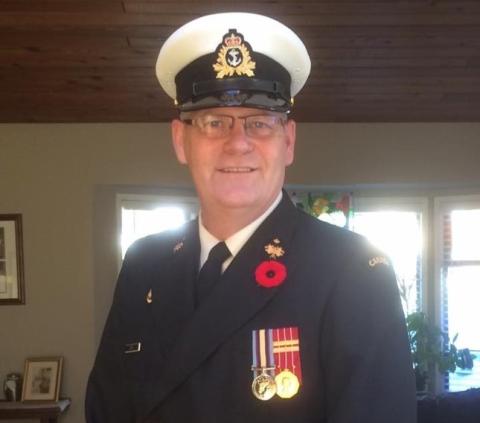
Joined
1981
Postings
- Halifax, NS
- CFB Esquimalt, BC
- Calgary, AB
Deployments
- Gulf war
- HMCS Huron
- HMCS Restigouche
- HMCS Gatineau
- HMCS Athabaskan
For a kid growing up in Lethbridge, Alberta, envisioning a future at sea might seem like a stretch. After all, the Pacific Ocean is 1200 km away to the west, and to the east it’s almost four times as far to reach the Atlantic.
And yet, David Joseph Bodie found a way to make his naval aspirations come true.
One of five children, Bodie was born in Calgary, Alberta, in 1961, just a few years before his family would move to Lethbridge. There, he enjoyed what he calls “a regular childhood” that included a stint in the Cubs, the popular youth group that exposes kids to fun adventures and experiences in the great outdoors.
When the time came to transition to Scouts, a gym teacher suggested that maybe Bodie should give the Navy League Cadets a try instead. Intrigued, he went for it and ultimately enjoyed the time he spent learning about naval life.
Fast forward a few years. After working odd jobs here and there, Bodie was undecided about his future. Having thoroughly enjoyed his time as a Sea Cadet, he thought that maybe the Navy would be a good fit.
Within weeks of meeting with a recruiter, it was official. “11 March, 1981, in Calgary, I was sworn-in to the Forces,” he says. “And on March 12 I was on a plane to Cornwallis, Nova Scotia.”
Basic training was an intense 11 weeks. Then, after graduation, “the 12 Navy guys,” as he puts it, were sent to Halifax “to learn how to be sailors” .
“The military mindset had already taken over. It gave my life some direction, and changed my perspective.”
That June, Bodie flew back home for the first time in months. But being there felt different than it ever had before. “The military mindset had already taken over. It gave my life some direction, and changed my perspective.”
He would go on to spend four and a half months at CFB Esquimalt, learning to be a Signalman Sea (known today as a Naval Communicator) before receiving his first posting to HMCS Huron back in Halifax.
On the Huron, Bodie learned how to be a sailor and a tradesman, and early on was exposed to the perils of life at sea.
“We ended up going on fisheries patrol in February as the ready-duty ship. It was a stormy season, and we ended up doing three rescues at that particular time, of ships getting caught in storms. Basically, I spent my first four weeks in the North Atlantic, it was quite the introduction!”

Dave Bodie (left) on HMCS Huron.
From there, Bodie went about learning his trade. He would spend two years based out of Halifax then four more in Esquimalt, working on HMCS Restigouche and HMCS Gatineau. Then it was on to Calgary for another two years before returning once more to Esquimalt.
After a long trip to the Far East in 1990, Bodie was on leave when the conflict in the Persian Gulf began.
“I was kind of watching on the news, just like everybody else,” he says, not even thinking that he might end up going to war. But within two days of returning to work that August, he learned that he would be part of the West Coast Task Force that would eventually be sent to take over for HMCS Athabaskan.
“It was a bit of a shock, I’m not going to lie. But on the flip side, this is what we trained for.”
In January 1991, HMCS Huron set sail for the Persian Gulf. About half-way through the Atlantic crossing, the war ended. Still, there was work for the Huron to do, including interdiction duties to complete in the Gulf.
“We ended up going anyway. We’d left on January 4 and didn’t get home until August 7. We did interdiction, we went into Kuwait City where the oil wells were still burning at the time.”
“That was nerve-wracking. Even though it was a clear channel into Kuwait City, there still was real concern about hitting a mine, especially since two American ships had just hit mines a couple of weeks before. It was a very surreal experience.”
There was also the not so small matter of transiting a minefield to get into port. “That was nerve-wracking. Even though it was a clear channel into Kuwait City, there still was real concern about hitting a mine, especially since two American ships had just hit mines a couple of weeks before. It was a very surreal experience,” he says.
Bodie and the rest of the Huron crew would return from the Gulf unscathed. He would go on to serve another 25 years in the military before finally retiring as Chief Petty Officer 1st Class in 2016.
Looking back, he has no regrets about the career he chose.
“I met so many amazingly dedicated people, to doing the job and doing it well. I saw amazing places. We were in Vladivostok. The highlight of my career, being in communist Russia at the end of the Cold War. We did rescues at sea. Drug busts with the RCMP. Peacekeeping. We believed what we were doing was important to Canada.”
“The military was very good to me.”
If you a Veteran, family member or caregiver in need of mental health support, the VAC Assistance Service is available to you 24/7, 365 days a year at no cost. Call "1-800-268-7708 to speak to a mental health professional right now.